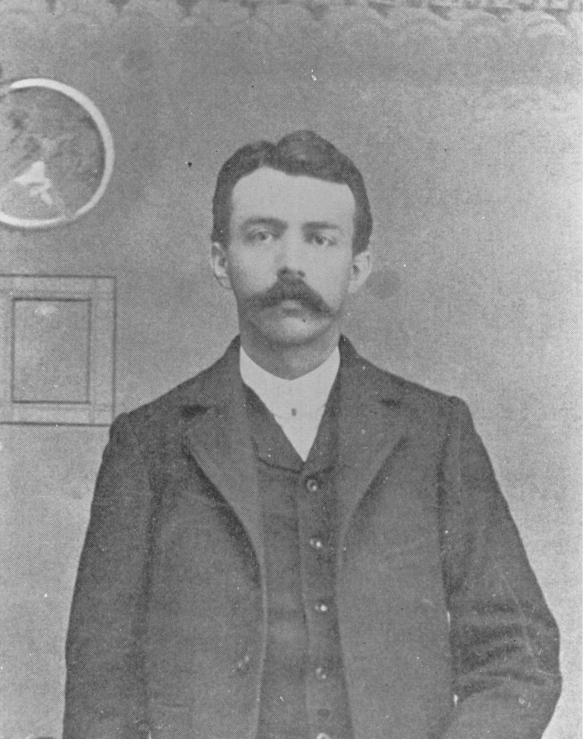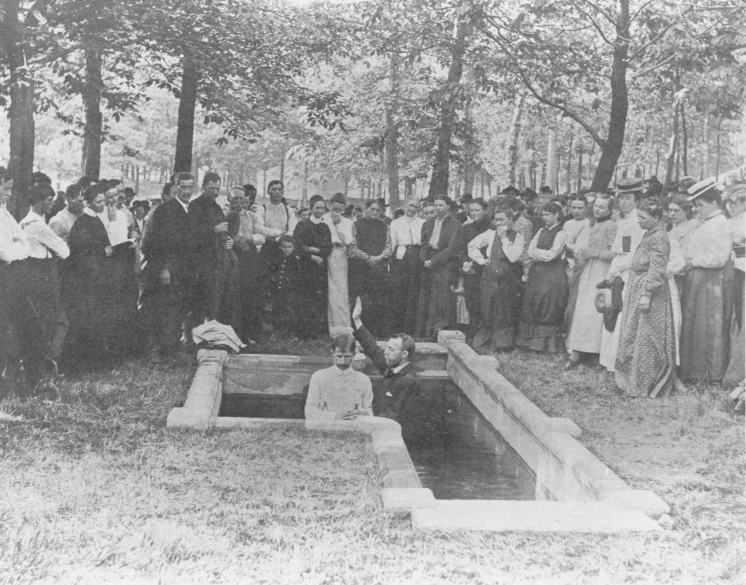
Wilhelm (William) Ebel was born in Hanan, Germany, in 1863. Having come to the United States, he was “born again” in California on March 20, 1892, at the age of 29. He met D. S. Warner in Los Angeles and readily recognized the Spirit in him to be the same which had breathed new life into his own soul. Likewise, D. S. Warner recognized the Spirit of God in Ebel and soon baptized him. That led to an invitation from D. S. Warner to come to Grand Junction, Michigan, and join the Trumpet Family, which William Ebel accepted in February of 1893. D. S. Warner was wanting to launch a German publication of The Gospel Trumpet and William Ebel was definitely a man qualified to labor in that capacity.
The following information shared on
https://walkingwithwarner.blogspot.com/2011/07/william-ebel-by-kurt-pudel.html by Wayne Warner regarding Kurt Pudel’s book about William Ebel is very interesting:
“The Saints were not in Grand Junction long before expanding the ‘Gospel Trumpet’ to the ‘Evangeliums Posaune’ and several other ethnic publications. ‘EP’ launched in 1895 with a printing of 8,000, edited by Fred Hahn. William Ebel assumed the editorship in 1899.
“In 1902 Ebel launched his own itinerant preaching ministry, both German and English, throughout the U.S. and Canada. He married Anna Thiessen of Marion, SD in 1908; they announced their calling to Russia in December 1909, and arrived in Riga (now Latvia) that same year.
“Together, they ministered throughout Eastern Europe, where William become a model mentor and missionary to many fellow believers. He was a man of strong faith, a man of practiced prayer, and a strong preacher in both English and German. They endured their share of suffering, losing one child, but always remaining positive and faithful. Keeping a forward look enabled William to help launch both a Latvian Basune and a Russian Truba (Trumpet).
“The following quotation from 1914 (p. 79) spoke to me of their venturing spirit: ‘But despite the great poverty and hard times, they had been able to save almost all the money required for a new printing press, and were lacking only one dollar.’
“Missionary work kept them mobile and required a certain flexibility and willingness to live with patience. WWI added suffering, poverty, and strain, and the author shares some of that with the reader. The war finally made it necessary to leave Riga. Caught in Bucharest, Romania, they had to stay throughout 1917-18 and necessity forced William to find secular employment. They ultimately escaped in early 1919 and returned to Gospel Ministry. …
“The Ebels were en route to an eventual return to Anderson when they stopped in Basel, Switzerland to minister for a time. It was there that William Ebel died on September 18, 1919. His epitaph in the Horburg Cemetery states, “For to me, to live is Christ, and to die is gain.”
“Anna returned stateside and eventually retired to St. Joseph, MI with her sister. Her Memorial Marker records her as “A Missionary of the Church of God.” Her travel chest can be observed in the B. E. Warren Cabin in Anderson, Indiana, on East 5th Street (Church of God Historical Society).
“They were a model of devotion to each other for 11 years, 8 months, and 18 days, as Anna noted (p. 102). The years of hardship took their toll and neither lived to be quite 60 years old, but they ‘served significantly.’ …”
[Note: You may contact Kurt Pudel at kpudel@interbaun.com to purchase a copy of his book about the life of William Ebel.]
William Ebel wrote the words to Evening Light Songs #144, “Be Still,” which made its first appearance in Truth in Song, 1907. He wrote this song before his marriage to Anna Thiessen in 1908. I heard Brother C. C. Carver tell the story many years ago about how Bro. Ebel came to write the words to that song. He said he contracted what was called the “seven-year itch.” He got so bad that he could not care for himself, so had to go stay with some of the other saints. His affliction dragged on and, in his misery, the Lord gave him the words of this song, “Be Still.” After he wrote those words, the Lord healed him.
William Ebel translated many of the songs published by the Gospel Trumpet Company into German and Russian. The saints in Germany and Russia hold Bro. William Ebel in high esteem for the great service he did to them in translating the songs into their languages.
In my personal visits to these countries I was told that Bro. Ebel’s boots were put in a museum there in Switzerland, where he died. The boots are curled up at the toes and a sign beside the display reads: “These are the boots of a praying man.” I have not been able to confirm this report, but found it very interesting!
The following picture is of William Ebel baptizing Dr. L. H. Morgan, author of the tract titled “A Doctor’s Experience of Divine Healing,” in the baptismal pool at Anderson, Indiana, in the early 1900s.
